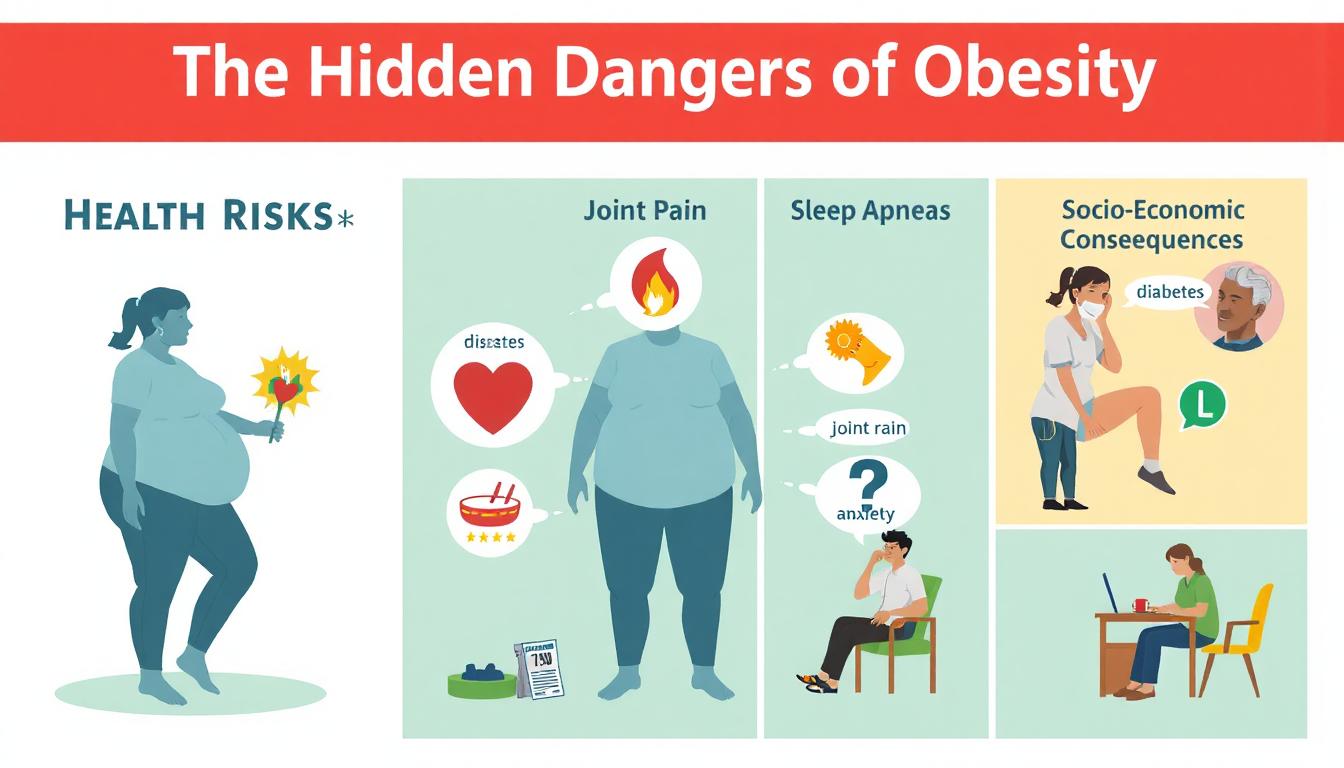The Hidden Dangers of Obesity: What You Need to Know
Obesity is a serious global health issue that has escalated significantly over the past few decades. The World Health Organization reports that obesity rates have more than doubled since 1980, affecting millions worldwide. But what exactly constitutes obesity? It is typically defined as having a Body Mass Index (BMI) of 30 or higher, often due to excessive calorie intake combined with inadequate physical activity.
Some may wonder, “What’s so bad about carrying a few extra pounds?” The reality is that obesity is linked to several severe health complications that can dramatically impact one’s quality of life. Conditions such as heart disease, type 2 diabetes, sleep apnea, and joint disorders are just a few of the many risks associated with obesity. However, the dangers extend beyond physical health, as obesity can also significantly impact mental well-being and socio-economic status.
Health Risks of Obesity
The most concerning aspect of obesity is its direct link to multiple life-threatening conditions. Among the most common health risks are:
- Heart Disease: Excess weight puts strain on the cardiovascular system, leading to high blood pressure, elevated cholesterol levels, and increased risk of heart attacks or strokes.
- Type 2 Diabetes: Obesity is one of the leading contributors to insulin resistance, a condition that can result in high blood sugar levels and, eventually, diabetes.
- Joint Problems: Additional weight exerts extra pressure on the joints, particularly in the knees, hips, and spine, leading to arthritis and chronic pain.
- Certain Cancers: Studies suggest that obesity is linked to an increased risk of cancers such as breast, colon, and pancreatic cancer due to hormonal imbalances caused by excessive fat storage.
- Sleep Apnea: Obesity can lead to airway obstruction during sleep, causing frequent breathing interruptions and poor-quality rest, which can contribute to fatigue and other health complications.
The good news is that adopting healthier habits can significantly lower these risks. By making gradual changes in diet and physical activity, individuals can improve their overall well-being and reduce the likelihood of developing these conditions.
The Impact on Mental Health
While physical health risks are widely discussed, the mental and emotional toll of obesity is often overlooked. Research has found strong correlations between obesity and mental health disorders such as:
- Depression and Anxiety: Many individuals struggling with obesity experience lower self-esteem, social stigma, and isolation, which can lead to depressive symptoms.
- Emotional Eating: Stress and emotional distress often result in unhealthy eating patterns, leading to a cycle of weight gain and deteriorating mental well-being.
- Cognitive Decline: Studies indicate that obesity may increase the risk of cognitive decline and neurodegenerative diseases later in life.
Seeking professional support from mental health experts, combined with lifestyle changes, can help manage these psychological challenges effectively.
Socio-Economic Implications of Obesity
Obesity also has broad socio-economic consequences, affecting individuals beyond personal health. Some of the key socio-economic impacts include:
- Higher Healthcare Costs: Obesity-related illnesses lead to increased medical expenses for individuals and healthcare systems.
- Reduced Work Productivity: Individuals with obesity may experience more frequent sick days and lower work performance due to health-related issues.
- Employment Discrimination: Studies show that people with obesity are more likely to face bias in hiring decisions, promotions, and salary disparities.
By addressing obesity through education and policy changes, societies can work towards reducing these economic burdens and improving quality of life for individuals affected by obesity.
Strategies for Preventing and Managing Obesity
Although obesity presents many challenges, it is possible to manage and prevent it through practical and sustainable strategies:
- Healthy Eating: Incorporate a balanced diet rich in fruits, vegetables, whole grains, lean proteins, and healthy fats while limiting processed and high-sugar foods.
- Regular Physical Activity: Aim for at least 150 minutes of moderate exercise per week, such as walking, cycling, or swimming.
- Portion Control: Being mindful of portion sizes can prevent overeating and help maintain a healthy weight.
- Hydration and Sleep: Drinking sufficient water and getting 7-9 hours of quality sleep per night can support metabolism and weight management.
- Stress Management: Practicing mindfulness, meditation, and relaxation techniques can reduce emotional eating and promote overall well-being.
- Seeking Support: Consulting with healthcare professionals, joining support groups, or involving friends and family can provide motivation and guidance for achieving weight management goals.
Conclusion
Obesity is a complex issue with far-reaching health, psychological, and socio-economic consequences. However, by making informed lifestyle choices and seeking support when necessary, individuals can effectively manage their weight and improve their overall well-being. Small, consistent efforts can lead to significant long-term benefits, creating a healthier and more fulfilling life. Remember, it is never too late to take control of your health and work towards a brighter, healthier future.


